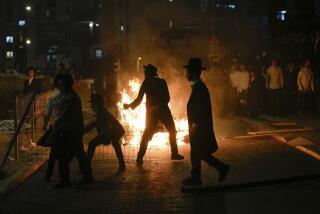In Iran, tensions build ahead of Rafsanjani’s Friday sermon
A self-described “party girl,” 28-year-old Ameneh Saeedi has spent the last few days brushing up on her prayers, which she hasn’t performed since she was forced to in high school.
This morning, Saeedi, a secretary, will skip her daily makeup routine and don an all-covering black hijab to attend a potentially momentous sermon by Ayatollah Ali Akbar Hashemi Rafsanjani, one that could herald a new stage in the political drama that has followed the disputed June 12 reelection of President Mahmoud Ahmadinejad.
Saeedi is among the thousands of Ahmadinejad opponents expected to show up at the Tehran University prayer service to be led by the powerful cleric. Reformist leaders, including presidential candidates Mir-Hossein Mousavi and Mehdi Karroubi and former President Mohammad Khatami, have vowed to attend.
Rafsanjani’s long-awaited sermon could pour water on the ongoing fire of protests or add more fuel to the dispute within the ruling establishment and Iranian society over the election results, which the powerful Guardian Council confirmed again Thursday in a 39-page document posted to its website.
Saeedi joked that she voted for Mousavi at the behest of friends. “One vote cost me a lot. I became a practicing Muslim again,” she said.
Frictions between Ahmadinejad and his rivals, who say they lost because of vote fraud, continued Thursday. The president, visiting to the northeastern city of Mashhad, angrily blamed the West for the recent days of unrest in which hundreds of thousands poured into the streets.
“As soon as the new government is established, with 10 times more power and authority than before, it will enter the global scene and will defeat the global arrogance,” he told supporters in a speech that was broadcast on state-controlled television.
Meanwhile, Gholamreza Aghazadeh, head of Iran’s Atomic Energy Organization for the last 12 years, announced he had resigned his post. Ahmadinejad’s economic minister, who was supposed to address worshipers before today’s sermon, abruptly canceled, and Justice Minister Gholamhossein Elham loudly protested a decision by the Rafsanjani-controlled Expediency Council to bar him from serving on the Guardian Council while in the Cabinet.
Rafsanjani, a Mousavi supporter and one of Iran’s wealthiest and most powerful men, announced this week that he would deliver a sermon Friday after a two-month absence. Cynics say the action signifies that he’s backing down from his staunch opposition to Ahmadinejad and will try to serve as a mediator in order to bolster the faltering legitimacy of his old friend, hard-line supreme leader Ali Khamenei.
“Mr. Rafsanjani is the cleverest politician in Iran,” said Mehdi Ataee, a Tehran shopkeeper who is a supporter of Ahmadinejad. “He knows what to say to appease both sides or simply ignore the hot issues and normalize the situation.”
The conservative daily Kayhan, considered a mouthpiece of the hard-line camp, urged Rafsanjani to take a tough stance against “rioters backed by foreigners,” the pro-government camp’s code for those who took to the streets to protest what they alleged was a rigged election.
Others see a potentially dangerous confrontation if Rafsanjani criticizes Ahmadinejad or raises concerns of vote fraud, a move that could spark renewed disorder in the streets.
“The understanding nation of Iran should be on alert so that the Friday prayers do not turn into unpleasant scenes,” Minister of Intelligence and Security Gholamhossein Mohseni-Ejei told the semiofficial Fars news agency. His comments were seen as a call to arms for pro-government plainclothes militiamen.
A circular widely distributed among Mousavi supporters urged those attending Friday prayers to turn the event into a peaceful protest. Men were asked to let their stubble grow and bring rosary beads to give the appearance of piety while women were reminded to bring prayer sheets.
“In the middle of the speech, to show our approval of what Rafsanjani says, instead of the usual slogan, ‘God is great, Khamenei is our leader,’ we say, ‘God is great! Death to the dictator,’ ” the circular said. “Our goal is not to participate in Friday prayers or stand behind [Rafsanjani]. The goal is to again gather millions of people in the street on Friday.”
--
Mostaghim is a special correspondent.
More to Read
Sign up for Essential California
The most important California stories and recommendations in your inbox every morning.
You may occasionally receive promotional content from the Los Angeles Times.










